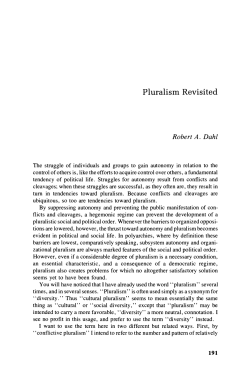
Brief - Carnegie Endowment for International Peace
BRIEF APRIL 2015 EGYPT’S NATIONALISTS DOMINATE IN A POLITICS-FREE ZONE MICHELE DUNNE ABOUT THE AUTHOR Egypt’s political scene has changed radically from the vigorous pluralism that followed the 2011 uprising; in 2015 the Islamist and secular groups that won those elections are excluded or marginalized. Nationalists associated with the military or former regime of Hosni Mubarak have retaken center stage, and rivalries within that camp have reemerged. Any parliament elected under such conditions is likely to be fractious—despite the lack of real pluralism—and might have difficulty fulfilling its constitutionally mandated role. Echoes of the Past •• •• •• Egypt has been without a full parliament since June 2012, when the previous assembly was dissolved. The 2013 removal of then president Mohamed Morsi from power brought a notable revival of a specific brand of nationalism—militaristic, populist, antiforeign—that evoked the Nasserism of the 1950s and 1960s, in contrast to the more inclusive strains of nationalism articulated during the 2011 uprising against Mubarak. Islamist and secular opposition forces have been mostly silenced or marginalized due to the banning of several groups including the Muslim Brotherhood, a harsh law against street protests, an electoral law that disadvantages political parties, and other measures that have undercut media and civil society. •• •• associate in Carnegie’s Middle East Program, where her research focuses on political and economic change in Arab countries, particularly Egypt, as well as U.S. policy in the Middle East. CONTACT •• •• •• Nationalists have fallen into squabbling among themselves because their political rivals from other ideological trends have been mostly eliminated. Parliamentary elections have been postponed repeatedly, apparently due at least in part to President Abdel Fattah el-Sisi’s failure to settle these rivalries. Sisi’s lack of interest in civilian politics is one of several reasons why there has not been a new nationalist political party formed to replace Mubarak’s National Democratic Party, a major target during the 2011 uprising. Differences between the military and business leaders, and between the military and other security services, are on display in ways similar to those of the late Mubarak era. Implications for the Future •• Michele Dunne is a senior There are many parallels between the current political scene and the one that prevailed in late 2010, when elections that excluded most opposition—and yet were still corrupt and violent— contributed to growing public disgust with the Mubarak regime. Elections held without real pluralism are likely to produce a parliament made up of individuals only seeking personal economic advantage. Such a body might be difficult to manage and unable to provide the check on the executive branch that is laid out in the constitution, a somewhat more robust role than during the Mubarak era. If the parliament is fractious, or indeed if the three-year hiatus in parliamentary life continues, Egyptians’ sense of ongoing political dysfunction will only increase. Christopher Dockrey Government Affairs Manager +1 202 939-2307 cdockrey@ceip.org Clara Hogan Media Manager +1 202 939-2241 chogan@ceip.org CARNEGIE ENDOWMENT FOR INTERNATIONAL PEACE The Carnegie Endowment for International Peace is a unique global network of policy research centers in Russia, China, Europe, the Middle East, and the United States. Our mission, dating back more than a century, is to advance the cause of peace through analysis and development of fresh policy ideas and direct engagement and collaboration with decisionmakers in government, business, and civil society. Working together, our centers bring the inestimable benefit of multiple national viewpoints to bilateral, regional, and global issues. © 2015 Carnegie Endowment for International Peace. All rights reserved. The Carnegie Endowment does not take institutional positions on public policy issues; the views represented here are the author’s own and do not necessarily reflect the views of Carnegie, its staff, or its trustees. CarnegieEndowment.org @CarnegieEndow facebook.com/ CarnegieEndowment
© Copyright 2025



















